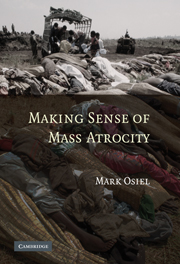Introduction
Published online by Cambridge University Press: 15 September 2009
Summary
From Dachau to Darfur, it is often surprisingly hard to say precisely who is really responsible for what horrors, for which share of a long and tangled episode of mass atrocity. Historians and social scientists generally pride themselves on explaining such a large event entirely in collective terms, irreducible to the acts or intentions of any participant. These scholars are content to speak of Serbs and Bosnians, armies and terrorist networks, of the political dynamics and social forces at play.
But for lawyers – those who must prosecute such wrongs (and defend the accused) – the devil necessarily lies in the proverbial details of who did which terrible thing to whom, in what manner, at a given time and place, with what purpose in mind. Our approach is thus unabashedly “reductionist,” in the sense of reducing all large abstractions to the most concrete particulars.
Yet can this lawyerly reductionism offer a coherent and defensible account of and response to massive genocide? After all, even the most powerful heads of states need not fully control all those around and below them, especially high-level comrades or death squads beyond their formal authority, often with agendas of their own. Almost never are the worst wrongs readily traceable to direct orders from above, descending through an orderly chain of command to regular army troops. And rarely does a head of state have any advance knowledge of the factual specifics that courts would normally require to convict anyone of such grievous wrongs.
- Type
- Chapter
- Information
- Making Sense of Mass Atrocity , pp. 1 - 15Publisher: Cambridge University PressPrint publication year: 2009



